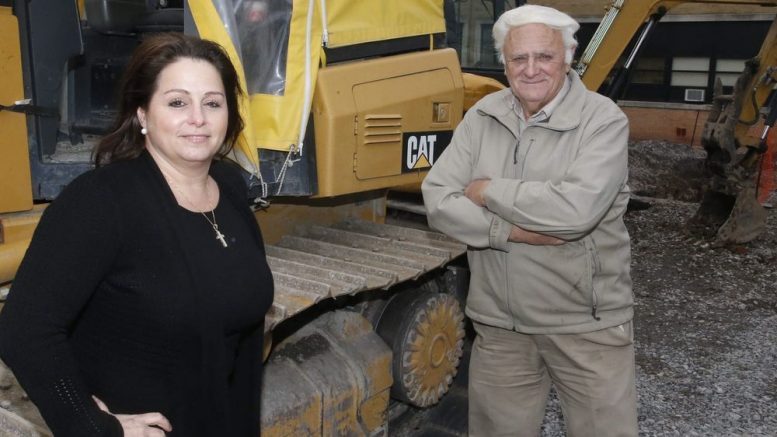Rosanne DiPizio filed a federal lawsuit in July 2015, accusing state development officials of racketeering. She claimed that state officials illegally terminated her construction company’s $19.8 million contract to build the ice rink at Canalside and then arranged to have the contract turned over to a politically-connected Rochester company.
So far, federal judges have handled the case like a “hot potato,” her lawyer said. Over the past 10 months, the suit has been transferred six times.
Three months after the lawsuit was filed in New York City, a judge there ruled that the case should be moved to Buffalo’s federal court.
In late March of this year, two different federal judges in Buffalo disqualified – or recused – themselves from the case, and it was shifted to Frank P. Geraci Jr., the chief district judge in Western New York.
In late June, Geraci transferred the case to Rochester-based Elizabeth A. Wolford, who became the fifth federal judge to take it on.
But on Thursday, Wolford recused herself, and it landed back in Geraci’s court.
On Friday, court officials would not comment when asked if Geraci plans to keep the case.
No one has criticized any of the judges for stepping away from the case, and they are not required to give a reason.
Under laws governing ethical conduct, though, federal judges are required to recuse themselves where there could be an appearance that the judge – because of a friendship, a past association in the legal profession, or any other reason – could have a bias.
The change in judges frustrates DiPizio, who says her family’s companies – DiPizio Construction and Dreamco Development – are unable to bid on government public works projects because the state alleged it botched the ice rink project.
“When people say the wheels of justice turn slowly, they aren’t kidding,” DiPizio said. “I’m looking for justice. I want my day in court. I filed my case in July of last year, and we still don’t know what judge will be handling it.”
Her attorney, Daniel W. Isaacs of New York City, said he has not seen a situation like this before.
“It’s obviously a very hot potato,” he said. “In 25 years practicing law, including time that I worked as a law clerk in federal court, I’ve never seen a case change hands so many times.”
Isaacs and William T. Brennan, lead attorney for the state officials, were asked why they think so many judges have passed on the DiPizio case.
“Here, in Buffalo, everyone seems to know everyone. You have a small number of judges. A lot of them know somebody associated with the lawsuit,” Brennan said.
Isaacs said he believes it is because of the nature of the case.
“We’ve raised a lot of very serious allegations. I think our case is the tip of an iceberg, and it could be related to other situations that are under investigation in Buffalo,” Isaacs said.
Allegations raised in DiPizio’s lawsuit may be related to other matters that some of the judges are handling, he said.
Isaacs said he filed the case in New York City to avoid potential conflicts involving the federal judges in Buffalo. Lawyers for the defendants, including the Empire State Development Corp., insisted and successfully argued that it be moved to Buffalo, he said.
“The defendants knew that, if they asked for change of venue, that would delay the case for months, and if they moved it to Buffalo, there would more delays,” Isaacs said. “The defense strategy has been ‘tie things up, tie things up, tie things up’ and hope that my client will give up and walk away. They’re making a big mistake if they think that will happen.”
Those allegations are untrue, Brennan said.
“We asked for this case to be moved to Buffalo because Buffalo is where the events took place, Buffalo is where the witnesses are and Buffalo is where all the documents are,” Brennan said. “And the court agreed with us. This was not a delaying tactic … We want this case to end, and we have asked for it to be dismissed.”
Phillips Lytle lawyers argued a dismissal motion before Magistrate Judge H. Kenneth Schroeder Jr. in March and are awaiting a ruling. As a magistrate, Schroeder can only make a recommendation. The final ruling on the dismissal must come from a higher-ranking district judge.
The lawsuit stems from the state dismissing DiPizio’s company from the Canalside project, accusing the firm of “deficient work” on the project, which was about half completed when the firm was let go,
“DiPizio has failed to demonstrate any significant improvement in its performance,” wrote Thomas Dee, president of Erie Canal Harbor Development Corp., the state agency that sent the termination letter.
DiPizio’s racketeering lawsuit claims DiPizio and her family’s construction businesses are victims of “an unlawful conspiracy to falsely blame DiPizio for the project’s delays to deflect attention from” state officials’ “malfeasance and as a pretext to wrongfully terminate” an agreement to build the ice rink. The Canalside rink opened in December 2014, two years later than originally scheduled, and state officials blamed the DiPizios.
The lawsuit accuses state officials of using “mail fraud and wire fraud” to make false allegations that the DiPizio family botched the job.
Then the state convinced the Travelers Insurance bonding company to hand the job over to the Pike Company, the lawsuit contends. The Rochester construction firm has given thousands of dollars to the campaigns of Gov. Andrew M. Cuomo and Lt. Gov. Kathleen Hochul.
The state denies the allegations and says the decision to hire Pike was made solely by Travelers Insurance and had nothing to do with politics.
Travelers Insurance has never explained why it selected Pike, but Travelers’ attorneys have argued that the state acted improperly in blaming the DiPizios for delays that were beyond their control.
Because of the legal dispute with the state, DiPizio said, her company cannot get performance bonding and cannot bid on public works contracts.
“We’ve been in business 37 years, and this is the first time we were not allowed to finish a job,” she said. “We’d normally have about 200 people working at this time of year. This year, we have about 40.”
The large majority of cases filed at federal court stay with the judges to whom they were assigned, with no recusals, according to legal experts.
And to have one case shifted six times is highly unusual, although appropriate if the judges saw potential conflicts, the experts said.
“Even if there is the appearance, or any hint” of possible bias, a judge should recuse, said James G. Milles, a UB law professor who is an expert on legal ethics.
Charles F. Ewing, a fellow professor at UB Law School, agreed.
While both professors said they believe the judges are acting correctly by recusing themselves, Ewing said he has never seen a case with so many judge changes.
Ewing, who has 32 years experience as an attorney, said he understands why DiPizio would be frustrated.
“At some point, the courts are going to have to find a judge who can hear this case,” Ewing said.
Source: www.buffalonews.com



